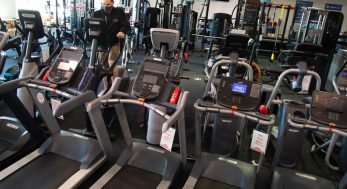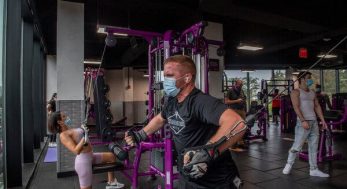Around 1:30 p.m. each workday, Manda Cox steps onto her “mobile office” – a treadmill at home.
For the next two hours, she works, logging about 7,000 steps while handling email and other business from a laptop perched in front of her.
“When my feet are moving, my mind is moving,” said Cox, a financial analyst for Duke Health System’s General Accounting & Financial Reporting.
With regular workout routines disrupted and gyms closed due to physical distancing during the COVID-19 outbreak, many Duke colleagues are finding alternative ways to fit in fitness.
The “Physical Activity Guidelines for Americans” by the U.S. Department of Health and Human Services says adults need at least 150 to 300 minutes a week of moderate-intensity aerobic activity. Adults also need muscle-strengthening activities, such as weights or push-ups, at least two days each week.
“Physical activity is essential to improving your emotional and physical health,” said Nick Beresic, health promotions manager for LIVE FOR LIFE, Duke’s employee wellness program. “Exercising is an opportunity to step away from the news, get some fresh air and stretch your body after a long day.”
Here’s how to fit in fitness.
Make a fitness plan

With yoga classes canceled, Melissa Wilson scheduled a remote fitness consultation with LIVE FOR LIFE, which provides consultations to employees at no charge. Wilson talked with Claire Beeson, a fitness specialist for LIVE FOR LIFE, over the phone to develop a plan that includes yoga sessions through YouTube and walking 7,000 steps a day.
“I’ve had personal trainers in the past, and that’s expensive,” said Wilson, a clinical nurse educator for Duke Raleigh Hospital. “Being able to talk with someone for free to figure out how I should be working out is amazing.”
Benefits-eligible employees can meet with a Duke fitness specialist two times a year at no charge. The consultation can be a 30-minute session over the phone.
Fitness consultations focus on small, realistic changes that fit your lifestyle and provide guidance for muscular strength, cardiovascular fitness, weight maintenance, stretching and more.
“Fitness consultations provide a workout format so you don’t have to wonder if you’re doing the right exercise,” Beeson said. “We can help find the perfect balance, so you’re not overworking or underworking your body.”
Get your heart rate up with cardio

Your heart rate is a clue to discover how hard you’re exercising. The more intense your workout, the higher your rate, which helps burn calories and body fat.
Kara Bonneau, director of the North Carolina Education Data Center at the Duke Center for Child and Family Policy, either runs or bikes daily for an average of 90 minutes as part of her training for the “Ironman Western Australia” on Dec. 6. During the event, she’ll swim 2.4 miles, bike 112 miles and run 26.2 miles.
“Cardio has been important for me because it’s been something that’s remained normal for me during this time,” Bonneau said. “It’s a way to get out of my house and do something positive for myself.”
The Centers for Disease Control and Prevention recommends 150 minutes of moderate to intense aerobic activity each week either through walking or biking; 75 minutes of vigorous aerobic activity such as running and playing tennis; or a combination of the two levels of activity. The activity can be spread out during a week any way you like.
Learn how to measure your heart rate on the CDC website.
No equipment required

Building muscle doesn’t take weights, a workout bench or expensive equipment. All you need is your body weight.
Michelle Mosberger, exercise physiologist and lifestyle counselor for the Duke Health & Fitness Center, said bodyweight exercises strengthen muscles, improve body compensation and increase flexibility.
She suggests a workout including versions of push-ups, squats, backward and/or side lunges, mountain climbers, planks, glute bridges and side-lying leg lifts. The general recommendation for strength training is two to three times a week of one to four sets of the exercises with eight to 15 repetitions of each exercise per set.
“Even though you don’t have access to what you normally do, you can get a lot of exercises done at home,” Mosberger said. “Our bodies are basically free workout tools.”
During a typical semester, Duke Softball Head Coach Marissa Young challenges her team to compete in a series of fitness challenges. The coaches and students see who can record the most push-ups, hold the longest pull-up and do the longest wall sit. For wall sits at home, Young recommends doing three sets of the exercise for 45 to 60 seconds each.
Now, with the softball season canceled, Young completes a daily workout with her husband and four children: Tabata. A Tabata workout can include burpees, push-ups, squats, mountain climbers and lunges. Each exercise generally lasts four minutes, and you do eight repetitions of each exercise in a row.
“No equipment workouts make it easy to find a consistent time each day to do your workout,” Young said. “You don’t have to worry about traveling anywhere or gathering up equipment. It’s a matter of training your body to recognize that it’s time to get moving.”
For more workout ideas, visit Duke Recreation & Physical Education’s free video library of exercise routines.
Stretch and walk frequently

Jeff Wright gets up from working every 30 to 45 minutes to stretch, take a walk around his house, get water or climb stairs.
“I’m no longer having meetings around campus or getting up to talk to colleagues,” said Wright, computer facilities manager for Duke Computer Science. “Everything is being done at my desk. It’s become much more of a focused effort to get up and move.”
Taking mini breaks to stretch and walk was among Nick Beresic’s recommendations during a recent webinar on “Fitting in Fitness.” He recommends moving and stretching every 30 minutes to prevent aches and stiffness.
“Our body doesn’t respond well to sitting in front of a computer all day,” Beresic said. “Taking mini-breaks gives our eyes a rest, stretches out our body and gives our brain time to recharge.”
VIDEO: Incorporate these strength exercises into your workout:
Help us share the proactive and extensive work being done by all Duke community members. Please share ideas, shout-outs and photographs with us here or write us at working@duke.edu.

